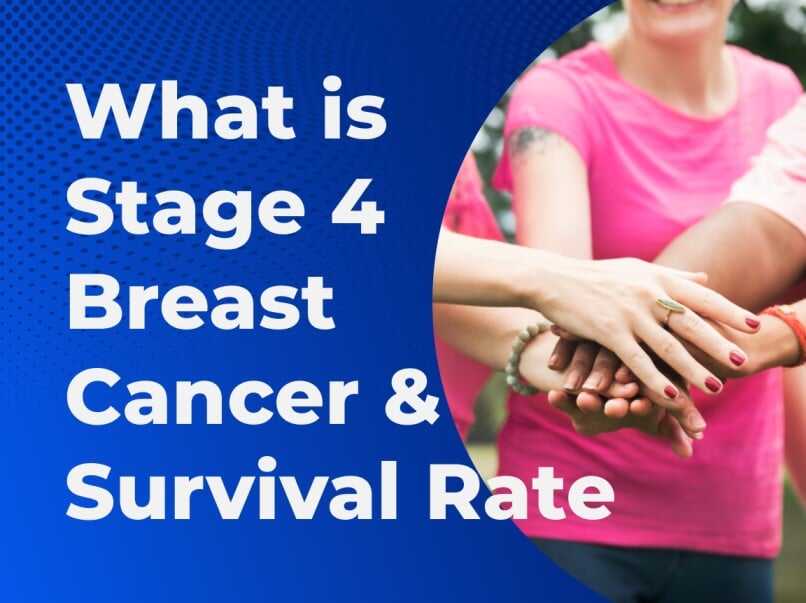Stage 4 breast cancer—also called metastatic breast cancer—means malignant cells have traveled beyond the breast and regional lymph nodes to distant organs. Once metastasis occurs, the clinical goal shifts from cure to long-term control, symptom relief, and maintaining function. Care plans combine systemic therapies (endocrine, targeted, chemotherapy, immunotherapy) with supportive measures and, when appropriate, local treatments for specific lesions. Discussions about stage 4 breast cancer life expectancy or life expectancy with stage 4 breast cancer are individualized, because biology, treatment response, and overall health vary widely. People can live for years with ongoing therapy and monitoring.
How Does Stage 4 Breast Cancer Spread?
Breast cancer cells acquire the ability to invade nearby tissue, enter blood or lymphatic vessels, and seed distant organs. This multistep process—local invasion, intravasation, survival in circulation, extravasation, and colonization—is influenced by tumor subtype (hormone-receptor positive, HER2-positive, or triple-negative) and microenvironmental factors. Understanding spread patterns helps clinicians anticipate complications and tailor surveillance. These dynamics also underpin conversations around life expectancy stage 4 metastatic breast cancer, since metastatic burden, pace, and site of spread meaningfully shape prognosis and treatment intensity over time.
Common Sites of Metastasis (Bones, Lungs, Liver, Brain)
Bones are the most frequent destination and can cause pain, fractures, and high calcium levels; focused radiation and bone-modifying agents often help. Liver metastases may raise liver enzymes and cause fullness or jaundice; systemic therapy is central, with local ablation options in select cases. Brain metastases can trigger headaches, vision or cognitive changes; modern radiotherapy and targeted agents play key roles. Lung metastases may cause cough or breathlessness; oxygen, steroids, and systemic therapy provide relief. Because pulmonary involvement is common, patients often ask about stage 4 breast cancer spread to lungs life expectancy; outcomes depend on tumor subtype, burden, comorbidities, and response to treatment.
How is Stage 4 Breast Cancer Diagnosed?
Diagnosis integrates imaging (CT, PET/CT, bone scan, MRI for brain or spine as indicated) with biopsy of a metastatic site to confirm breast origin and reassess biomarkers. Lab work evaluates organ function and treatment fitness. Establishing disease extent at baseline enables objective tracking of response and informs expectations around stage 4 metastatic breast cancer life expectancy. Re-biopsy can matter if biology changes over time (e.g., loss or gain of HER2), potentially opening new targeted options and altering predicted benefit from therapies.
TNM System and Biomarkers (Estrogen, Progesterone, HER2)
While metastatic disease is classified as stage IV by definition (any T, any N, M1), TNM descriptors still guide records and research. Biomarkers drive therapy: ER/PR-positive cancers often respond to endocrine therapy plus CDK4/6, PI3K, or other targeted agents; HER2-positive disease benefits from anti-HER2 combinations; triple-negative disease may respond to chemotherapy, antibody-drug conjugates, or immunotherapy when eligible. Because treatment selection strongly influences breast cancer stage 4 life expectancy, accurate receptor testing and periodic reassessment are essential. Genomic profiling can reveal actionable alterations that further personalize care.
What is the Life Expectancy for Stage 4 Breast Cancer?
There isn’t a single number that fits everyone. Stage 4 metastatic breast cancer life expectancy ranges broadly based on subtype, disease volume, organ function, prior therapies, and access to modern treatments. People often ask, what is stage 4 breast cancer life expectancy or life expectancy for stage 4 breast cancer after spread to lungs, liver, or brain. In general, effective systemic therapy can extend stage 4 breast cancer life expectancy with treatment substantially compared with stage 4 breast cancer spread to lungs life expectancy without treatment. Pulmonary-only disease that responds to therapy may be controlled for years; widespread, rapidly progressive disease shortens outlook. Continuous reassessment keeps expectations realistic and hopeful.
Stage 4 Breast Cancer Survival Rate
Population survival rates describe groups, not individuals. They combine many subtypes and ages and don’t reflect the impact of new regimens introduced after the data were collected. That’s why life expectancy stage 4 breast cancer statistics should be viewed as rough context. A person with endocrine-responsive, bone-predominant disease who tolerates therapy well can experience long disease control, while refractory, multi-organ triple-negative disease carries a tougher course. Clinical trials and next-line agents continue to shift these curves, so current, personalized plans matter more than historic averages.
Factors Affecting Survival (Age, Health, Cancer Subtype, Metastasis Location)
Key determinants include age and performance status; tumor biology (ER/PR, HER2, proliferation rate); metastatic sites (bone-only vs liver/brain involvement); number and size of lesions; treatment history; and treatment tolerance. Supportive care (pain control, bone protection, thrombosis prevention, nutrition, exercise) also influences outcomes and quality of life. These factors explain why phrases like life expectancy stage 4 metastatic breast cancer, life expectancy with stage 4 breast cancer, or breast cancer stage 4 life expectancy must be individualized—two patients with the same staging label can have very different trajectories.
FAQs
What is stage 4 breast cancer?
Cancer that has spread beyond the breast and regional nodes to distant organs (bone, liver, lung, brain). It’s treatable but usually not curable.
How does stage 4 breast cancer spread to other organs?
Through lymphatic and blood vessels; cells travel, exit into distant tissues, and establish new tumors influenced by subtype and microenvironment.
What is the life expectancy for someone diagnosed with stage 4 breast cancer?
It varies widely. Subtype, metastatic sites, treatment response, and overall health determine outcomes more than any single average.
Can stage 4 breast cancer be cured?
Durable remissions occur, but cure is uncommon. Long-term control with modern therapies is possible for many patients.
What are the common treatment options for stage 4 breast cancer?
Endocrine therapy, targeted agents, chemotherapy, immunotherapy, radiation, surgery for select issues, plus comprehensive supportive care.
How long can a patient live with stage 4 metastatic breast cancer?
Some live years with effective, well-tolerated therapy; others have faster-growing disease. Ongoing reassessment tailors expectations and treatment.
